- March 28, 2024
How Much Does a Cornish Rex Cost? 2024 Price Guide
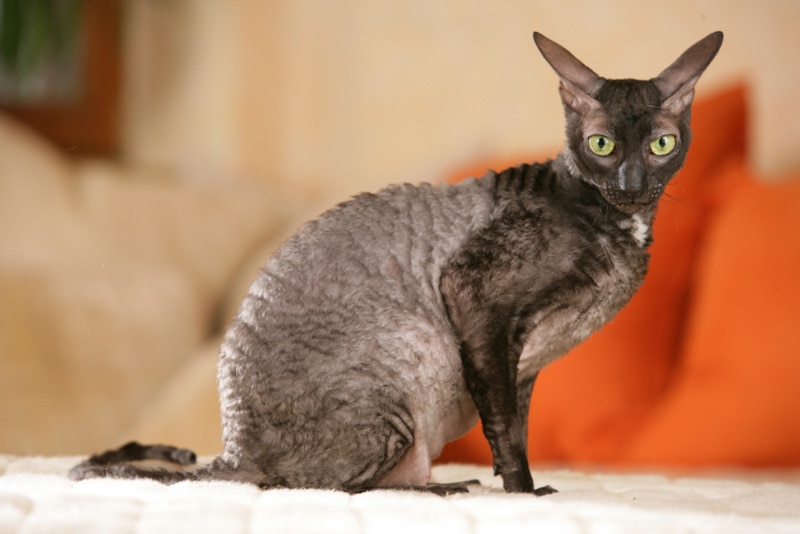

Cornish Rexes are charming cats with unique physical features. They quickly grow on people due to their friendly and outgoing personalities and playfulness. Many people refer to them as the “dogs of the cat world” due to how social they can be.
Cornish Rexes make wonderful family pets and tend to make home life more fun and exciting due to their entertaining antics. So, if you’re interested in caring for one, it’s time to consider their care costs.
Living with cats will take up a significant portion of your budget, and it’s essential to have realistic expectations of what you’ll be spending. Here are some key costs to consider before committing to bringing home a Cornish Rex.

Bringing Home a New Cornish Rex: One-Time Costs
The initial cost for Cornish Rexes usually reaches a couple of thousands of dollars. This is because Cornish Rexes kittens usually cost about $1,000. Since Cornish Rexes are playful and athletic, you’ll also want to invest in a durable set of toys and a tall cat tree, which can cost at least $100. The following estimates include the average costs of Cornish Rex kittens and the basic supplies during their first few weeks in their new homes.
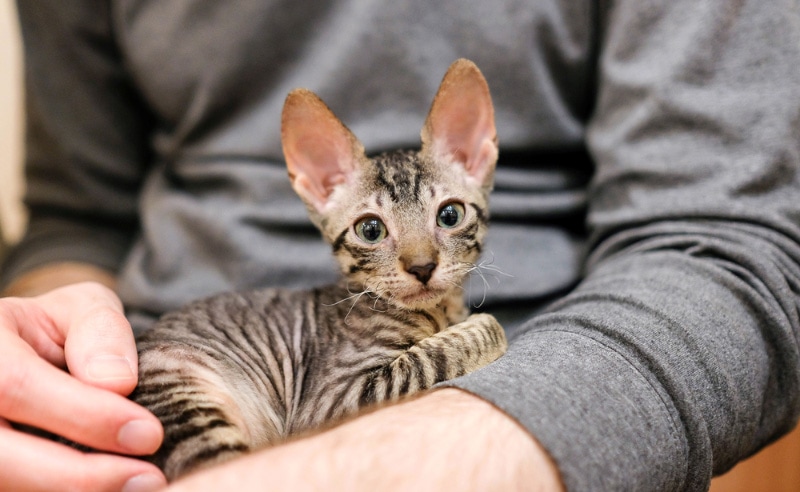
Free
It’s rare to find a free purebred Cornish Rex. However, since they’re a relatively popular breed, you may be able to find a breeder near you that’s looking to rehome an older Cornish Rex that’s retiring out of their breeding program. Your best bet in getting a Cornish Rex for free is to adopt them from a family member or friend who may not be able to care for them anymore.
Adoption
It’s not common to find purebred Cornish Rexes at adoption centers, but you can find mixed cats that have some Cornish Rex in them. Adoption fees will vary depending on the cat’s age. Kittens are usually more expensive, and senior cats will have a reduced fee.
Breeder
The price of purebred Cornish Rex kittens will depend on several different factors. First, the popularity of the breed in the breeder’s area can impact prices, with higher demand driving higher prices. Show-quality kittens with a more prodigious pedigree are usually significantly more expensive than Cornish Rex kittens that are bred to be house pets. Both show-quality kittens and house pet kittens will be healthy as long as you work with a reputable breeder. So, if you don’t plan to be a breeder, there’s really no need to purchase a show-quality kitten.

Initial Setup and Supplies
You can expect to spend around $1,000 on initial setup and supplies costs. Most of your initial costs will depend on your Cornish Rex’s veterinary care. Breeders and adoption centers will have their own protocols on how much they’ll cover for the Cornish Rex’s first year of veterinary care. So, you may need to pay out-of-pocket for spaying or neutering, microchipping, and vaccinations.

List of Cornish Rex Care Supplies and Costs
| ID Tag and Collar | $10–$15 |
| Spay/Neuter | $200–$500 |
| Vet Checkup | $40–$100 |
| Vaccinations | $150–$300 |
| Microchip | $45–$55 |
| Cat Tree | $50–$300 |
| Bed | $10–$20 |
| Nail Clipper (optional) | $10 |
| Litter Box | $10–$50 |
| Litter Scoop | $5–$10 |
| Cat Litter | $15–$50 |
| Toys | $20 |
| Carrier | $30–$40 |
| Food and Water Bowls | $10–$20 |

How Much Does a Cornish Rex Cost Per Month?
Most of your monthly costs will be spent on food, treats, litter box supplies, and toys. Monthly costs for Cornish Rex kittens tend to be more expensive than adult Cornish Rexes because they have to complete their vaccine schedules and get neutered or spayed if they hadn’t gotten the procedure before they entered your care. Monthly costs can also rise once your Cornish Rex becomes an older adult (senior) and is at higher risk of developing age-related health issues. You may find yourself having to pay for medications, supplements, or specialty diets.
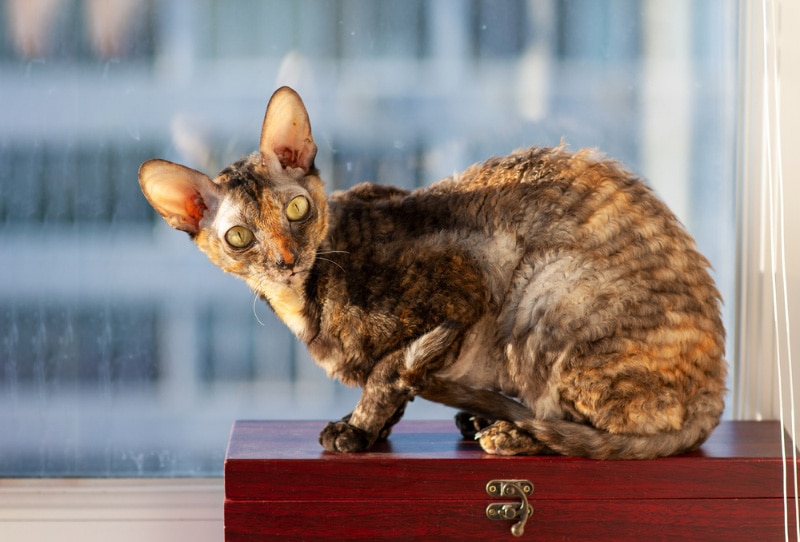
Health Care
Cornish Rexes are pretty healthy, so you probably won’t spend too much on veterinary care costs outside of routine check-ups until your cat starts to reach older adulthood. You can expect most of your monthly health care costs to go into food and any appropriate supplements.
Food
Cat foods have varying price points, and you can find some budget-friendly brands that don’t heavily sacrifice quality. You’ll also want to consider if you want to feed your Cornish Rex dry food or wet food. Dry food tends to be cheaper, and you can store it for much longer. If you really want to splurge and pamper your pet, you can look into premium cat food brands that sell fresh cat food recipes.
Grooming
Cornish Rexes are pretty low maintenance when it comes to grooming. They’re a low-shedding breed and don’t really need frequent baths. You may spend some money every few months on restocking grooming supplies. However, it’s likely that you’ll go through a couple of months where you don’t spend anything on grooming.
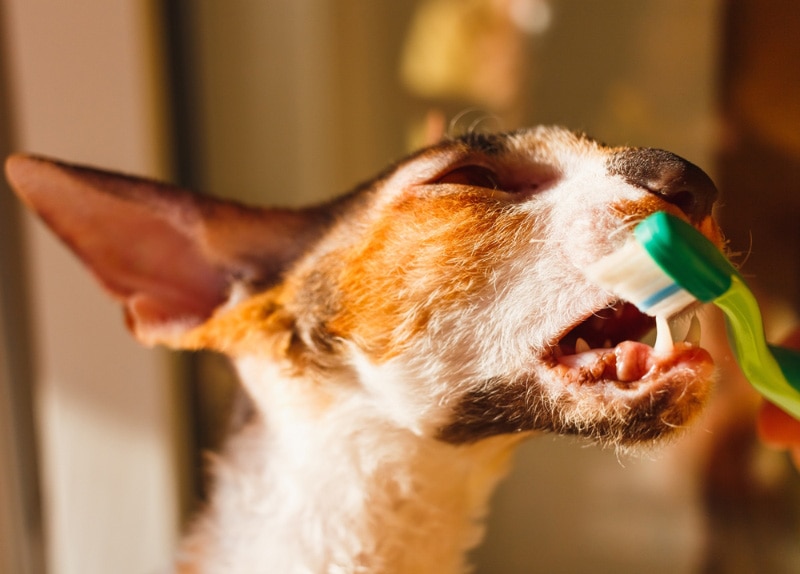
Medications and Vet Visits
Once your Cornish Rex completes their vaccine schedule, you’ll find monthly medical costs drop significantly. Your veterinarian may prescribe monthly dewormer medication and recommend certain supplements for specific health issues. Also, if your cat happens to be an outdoor cat, it’s likely you’ll spend more on monthly costs, especially if your cat needs to take flea and tick medication.
Pet Insurance
You can find cat insurance plans at varying price points, with some plans being as cheap as $15 a month. Plan premium prices will depend on several different factors. Your cat’s age will play a significant role as prices increase as your cat ages. Prices will also depend on how much coverage you sign up for. Cheaper plans will only cover medical costs related to accidents, while more comprehensive plans that cover costs related to health issues and illnesses are much more expensive.
Environment Maintenance
After you purchase initial supplies, most of your environment maintenance costs will come from litter box supplies. Along with regularly replacing cat litter, you’ll most likely have to use deodorizing sprays or granules to control odors. Cat scratchers can also get worn down pretty frequently, and it’s common to replace them on a monthly basis.
| Cat Litter | $15–$50 |
| Litter box liners | $10–$20 |
| Deodorizing spray or granules | $10–$15 |
| Cardboard Scratcher | $10–$30 |
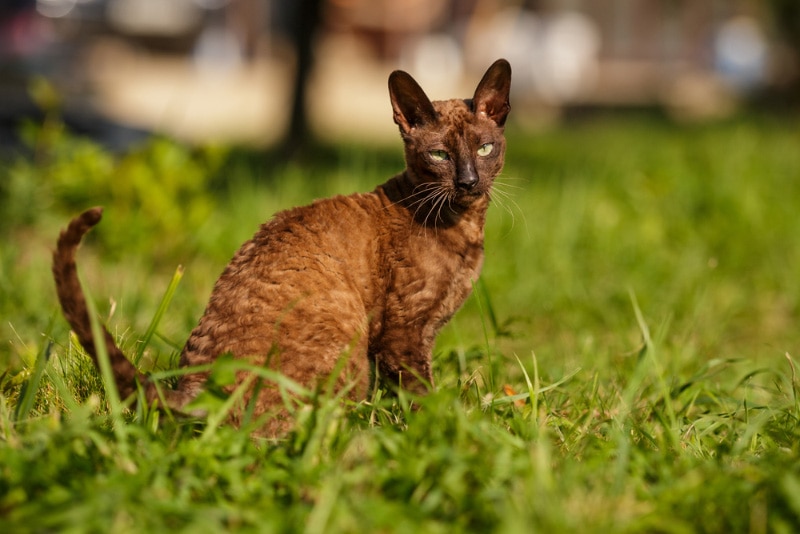
Entertainment
Cornish Rexes are very playful and can become very stressed if they don’t have outlets for them to expend their energy. Therefore, toys play an essential role in their lives. They’ll also appreciate vertical spaces and will love having platforms and shelves they can leap onto. Cat trees, window perches, and shelves are all items that Cornish Rexes will love.
You can save on toy and treat costs by subscribing to a monthly cat box. Cat boxes can cost anywhere between $15–$30. They contain several high-quality toys, and some will also include treats and accessories like clothes. Since cat boxes have a diverse rotation of toys, they’re considerable options for Cornish Rexes that tend to get bored easily.

Total Monthly Cost of Owning a Cornish Rex
Your Cornish Rex’s monthly costs will depend on several different factors. Young adult Cornish Rexes tend to have lower monthly costs because they usually have fewer veterinary care needs.
Fortunately, you’ll find a lot of wiggle room when budgeting monthly costs for your Cornish Rex. Choosing affordable brands and making informed purchases can help you save on costs, and this may even enable you to splurge on your pet and spoil them every once in a while.
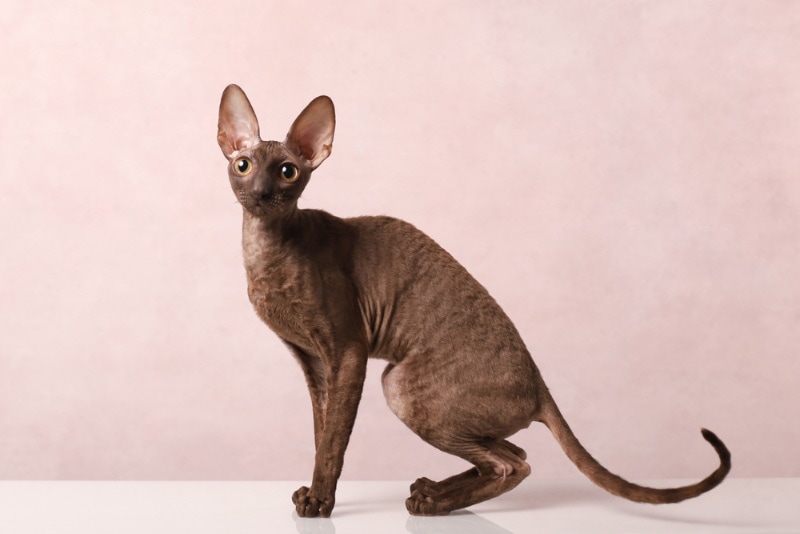
Additional Costs to Factor In
One of the most significant additional costs to consider for Cornish Rexes is companionship care. Cornish Rexes are very social and loyal. They become attached to their families and don’t do well if they’re left home alone for long hours. They often need a pet sitter if you have long work hours away from home.
If you don’t have pet insurance, it’s best to set aside an emergency veterinary care fund in case your Cornish Rex gets into any accidents. Veterinary bills can easily reach thousands of dollars. So, you may want to consider setting money aside every month when you’re budgeting.
Owning a Cornish Rex on a Budget
While cat owners will want to splurge on their cats and buy all the high-end products, it’s not a realistic option for most people. Your Cornish Rex mostly values your companionship and won’t complain if they don’t have a high-tech litter box or eat the most expensive meals. So, it’s okay to consider purchasing generic brands. Just make sure to do your research and consider customer reviews and quality before making purchases.
Keeping your Cornish Rex happy and healthy can also be a great way to save on veterinary care costs. So, making healthy lifestyle choices for your Cornish Rex can indirectly reduce monthly costs. This includes feeding them high-quality food and providing plenty of physical and mental exercise opportunities.
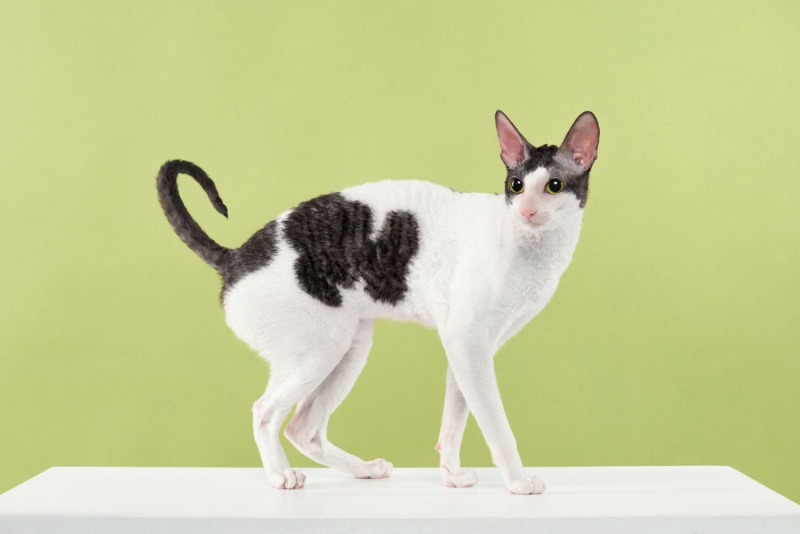
Saving Money on Cornish Rex Care
It does take a little more effort to find ways to save on care costs. However, you can experience significant savings over time if you do a little research. Along with choosing budget-friendly brands, start to familiarize yourself with your local pet supply store or favorite pet shops. You can sign up for email lists to receive notifications on sales and discount opportunities.
Some online retail stores have auto-shipping programs that offer discounts if you sign up for an auto-shipment schedule. These types of programs are great for items that you purchase regularly, like food and cat litter, and you can usually adjust the frequency of shipments to match your cat’s needs.

Conclusion
Overall, you can expect to make significant changes in your budgeting and spending when you bring home a Cornish Rex. Initial setup costs can range between $500–$1,400, and monthly costs can be between $150–$600. Most of your monthly costs will go into food, toys, and cat litter.
As the range of monthly costs depends on what types of products you purchase, you can experience significant savings by choosing the right brands. Signing up for subscription services for products that your Cornish Rex uses frequently can also help you save on costs. With a little research, it’s very possible to provide adequate care for a Cornish Rex on a budget and create a healthy and thriving environment for them.
Featured Image Credit: absolutimages, Shutterstock
Tags
What do you think?
Related Articles

New Puppy Checklist: Gear You’ll Need for Your New Dog
Getting a new puppy is really exciting, but before you welcome them home, it’s important to prepare your space for them. Since puppies need a

How Big Do Mini Poodles Get? Vet Reviewed Average Weight & Growth Chart – Dogster
The information is current and up-to-date in accordance with the latest veterinarian research. Learn more » When you buy a Miniature Poodle, you might not

Can Police Dogs Smell Nicotine? Vet Verified Facts & Info – Dogster
The information is current and up-to-date in accordance with the latest veterinarian research. Learn more » While cigarette sales have been declining steadily for decades,

How Old Is 5 in Dog Years? Vet-Approved Guide to Each Size of Dog – Dogster
The information is current and up-to-date in accordance with the latest veterinarian research. Learn more » A common method for calculating a dog’s age is

